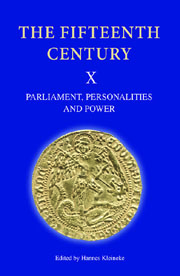Book contents
- Frontmatter
- Contents
- List of Illustrations
- Contributors
- Acknowledgements
- Preface
- Abbreviations
- The People and Parliament in Fifteenth-Century England
- ‘A Beest envenymed thorough … covetize’: an Imposter Pilgrim and the Disputed Descent of the Manor of Dodford, 1306-1481
- Henry Inglose: A Hard Man to Please
- London Merchants and the Borromei Bank in the 1430s: the Role of Local Credit Networks
- ‘Mischieviously Slewen’: John, Lord Scrope, the Dukes of Norfolk and Suffolk, and the Murder of Henry Howard in 1446
- A Fifteenth-Century Medicus Politicus: John Somerset, Physician to Henry VI
- ‘Domine Salvum Fac Regem’: The Origin of ‘God Save the King’ in the Reign of Henry VI
- ‘Monuments of Honour’: Clerks, Histories and Heroes in the London Livery Companies
- The East Anglian Parliamentary Elections of 1461
- Changing Perceptions of the Soldier in Late Medieval England
- Thomas More, the London Charterhouse and Richard III
- Index
- Tabula Gratulatoria
‘A Beest envenymed thorough … covetize’: an Imposter Pilgrim and the Disputed Descent of the Manor of Dodford, 1306-1481
Published online by Cambridge University Press: 05 February 2013
- Frontmatter
- Contents
- List of Illustrations
- Contributors
- Acknowledgements
- Preface
- Abbreviations
- The People and Parliament in Fifteenth-Century England
- ‘A Beest envenymed thorough … covetize’: an Imposter Pilgrim and the Disputed Descent of the Manor of Dodford, 1306-1481
- Henry Inglose: A Hard Man to Please
- London Merchants and the Borromei Bank in the 1430s: the Role of Local Credit Networks
- ‘Mischieviously Slewen’: John, Lord Scrope, the Dukes of Norfolk and Suffolk, and the Murder of Henry Howard in 1446
- A Fifteenth-Century Medicus Politicus: John Somerset, Physician to Henry VI
- ‘Domine Salvum Fac Regem’: The Origin of ‘God Save the King’ in the Reign of Henry VI
- ‘Monuments of Honour’: Clerks, Histories and Heroes in the London Livery Companies
- The East Anglian Parliamentary Elections of 1461
- Changing Perceptions of the Soldier in Late Medieval England
- Thomas More, the London Charterhouse and Richard III
- Index
- Tabula Gratulatoria
Summary
The dispute over the valuable manor of Dodford, a few miles west of Northampton, was intermittently in agitation for 175 years. Its longevity recommends it as a subject of study, as does the survival of a narrative statement, drawn up in the late 1470s, outlining the case of one of the disputants and providing some curious details about what the compiler of the narrative professed to take as the origin of the manor's disputed ownership. Such narratives, more extended than simple statements of title, are infrequent survivals. This one, drawn up to answer a lost declaration of a claim, is not as vivid as some more famous and free-flowing examples, such as the much-longer description of the dispute between the Pilkingtons and the Ainsworths or the vituperative opening passages of the ‘Armburgh Papers’, yet it has enough of interest to repay attention. Further, the dispute provides a valuable illustration of a recurring theme of late-medieval landholding: uncertainty, once introduced into title, tended to echo down the generations. This not only posed difficulties for those who inherited or, unaware of the difficulties, purchased the disputed property, it also attracted the speculative interest of calculating opportunists. For the latter, who were often lawyers or royal servants, the complexity of a title might be an encouragement rather than a deterrent, a chance to acquire property at a discount on the speculation that they had influence enough to protect their possession. Such opportunist interventions perpetuated the dispute over Dodford, and ensured that title would not lie quietly in the hands of any tenant between the early fourteenth and late fifteenth centuries.
- Type
- Chapter
- Information
- The Fifteenth Century XParliament, Personalities and Power - Papers Presented to Linda S. Clark, pp. 17 - 38Publisher: Boydell & BrewerPrint publication year: 2011



